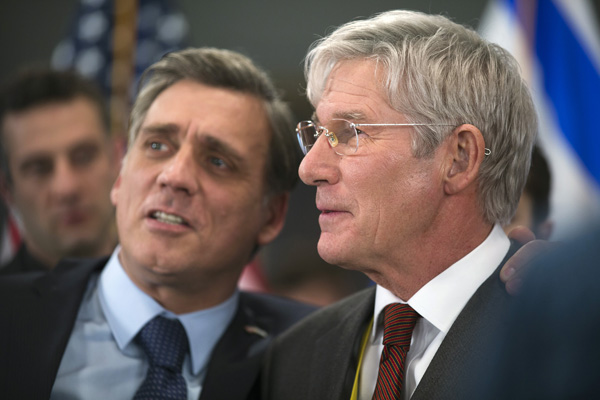![]() Norman: The Moderate Rise and Tragic Fall of a New York Fixer ranks among the best political satires, along with the likes of Barry Levinson’s Wag the Dog (1997) and Alexander Payne’s Election (1999). At a time when the U.S. administration is constantly in the news for ties to complex deals with American and foreign investors, businesses, and lobbyists, Norman is already one of the most relevant films of the year.
Norman: The Moderate Rise and Tragic Fall of a New York Fixer ranks among the best political satires, along with the likes of Barry Levinson’s Wag the Dog (1997) and Alexander Payne’s Election (1999). At a time when the U.S. administration is constantly in the news for ties to complex deals with American and foreign investors, businesses, and lobbyists, Norman is already one of the most relevant films of the year.
Writer/director Joseph Cedar knowledgeably draws on his binational background in the United States and Israel for his first (mostly) English language film, the fifth in his excellent oeuvre (including Beaufort and Footnote). With a large ensemble of American and Israeli actors (many cast against type, especially Richard Gere in the title role), he deftly pokes fun at the intersection of politics, business, and philanthropy, in which personal favors grease the wheels in a special relationship where the American Jewish community is an international constituency for the Israeli government.
Cedar says he was inspired by the historical and literary figure of “the court Jew,” the successful sycophant to the gentile power structure, but in any society the “fixer” is behind the scenes helping powerful people get things done. (Netflix will soon be showing the documentary about the renowned Republican “fixer” Get Me Roger Stonethat just world premiered at the Tribeca Film Festival.) Considerably more nebbishy than the real Stone, the fictional Norman Oppenheimer aspires to be a significant player—and who would ever think Gere could be cast and so magnificently disappear into such a character? (The make-up, over-sized suits, and stuck-out ears help, too.)
Norman is first seen in the middle of his usual roundelay of sidewalk phone calls as he tries parlaying insignificant encounters into connections to the rich and influential. His targets include Bill Kavish (Dan Stevens), the assistant to mogul Joe Wilf (Harris Yulin); canny entrepreneur Arthur Taub (Josh Charles); his lawyer nephew Phillip Cohen (Michael Sheen); and his about-to-be-evicted Rabbi Blumenthal (Steve Buscemi, another unusual casting choice). All of them pretty much treat him patronizingly as an annoying gnat, or worse.
Besides his constantly changing descriptions of his family, he touts that one of his talents is identifying potential prospects who can be of assistance in the future, and he hones in on a deputy to an Israeli cabinet minister, Micha Eshel (Lior Ashkenazi), who is at loose ends away from his wife during his first conference in New York City. What better to do with a restless foreign tourist than to take him shopping—though Norman’s sticker shock at the pair of elegant shoes he gifts the rising politician hints that he does not quite have the resources he projects. (Gere reveals strong comic timing in his reactions; he has not been used enough to this effect in his career.)
Time passes and Norman proves to be prescient, as his “good friend” Eshel climbs to the pinnacle of Israeli politics. Now if only Eshel would remember Norman and his strategic favor, as he has insinuated to all his contacts that the new prime minister, in fact, has. Norman’s whole life seems to come down to what will happen on the reception line at a national conference in Washington, DC—it’s much like the American Israel Public Affairs Committee—where all the movers and shakers in the American Jewish community are hustling. Will Eshel remember him? Cedar does a marvelous job of making Norman’s life-changing, wheeling and dealing visual on screen, as VIPs from every sector of the business, government, and charitable worlds come to him in a pleading whirl, bolstered by Jun Miyake’s jaunty score.
Norman can’t stop bragging about and puffing up his connections on the train back to New York to his seat mate, lawyer Alex Green (Charlotte Gainsbourg). She finally pays attention to him when he enthusiastically lists the personal favors he’s done for the Israeli politician and how that’s benefitted his other contacts. Even as those who disdain Norman continue to take advantage of his offers to help (think of the trades made by Milo Minderbinder in Catch 22), his sales pitch of how he could be useful as her fixer will come back to haunt him and Eshel, in headlines and scandal. (Some details and symbolism of Israeli government practices may go by American audiences with little loss of plot appreciation or enjoyment.)
Norman reminded me of a joke told during my days working for a politician who was a renowned fixer himself: A man joins a local political club claiming he can fix their parking tickets. The members insist that can’t be done, but he collects their tickets, and it works. His favors get him higher and higher patronage positions, but only at his retirement does he finally reveal how he did it: he paid the tickets. In the final act, Norman pays a very personal price for his rise and fall, and that we care about him so much amid his lies and his pitiful attempts to impress is a tribute to Cedar for creating a mensch, not a caricature, and Gere’s transformative and touching performance.

















Leave A Comment